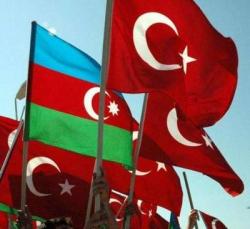
Alexandros Petersen, a nonresident senior fellow at the Council’s Dinu Patriciu Eurasia Center, was interviewed by Azerbaijan’s News.Az on the relations between Armenia, Turkey, and Azerbaijan.
How real are the improvements between Armenia and Turkey and Armenia and Azerbaijan at the moment?
In making these comments, President Sargsyan’s was just reaffirming the Armenian position that has existed for years. What is important here is that he chose to do so in an emphatic way. This is yet another signal that the Turkish-Armenian rapprochement effort has come to a standstill. This is not just because of pressure from Azerbaijan on Turkey, but also because of Turkish public opinion and stumbling blocks along the way to realizing the protocols that turned into obstacles. Turkish-Armenian and Turkish-Azerbaijani relations are not back to the way they were before rapprochement efforts, but Ankara and Baku are much closer now than some months ago. The best way to break the impasse now would be progress on Nagorno-Karabakh conflict resolution.
President Obama during his recent meetings with the heads of Turkey and Armenia expressed an interest in normalization of relations of Armenia with Turkey and Azerbaijan. What do you think about prospects of the Obama’s mediatory?
The Obama administration has a unique opportunity to broker conflict resolution between Azerbaijan and Armenia and to work closely with Turkey in finally bringing stable and eventually normalized relations between the three countries. Personal involvement from the U.S. president would be a major catalyst for breakthrough in the current impasse. This could be achieved with a trip to the region and personal brokerage of a serious Minsk Group meeting.
And what about upcoming April 24-Th, can Obama recognize the “Armenian genocide”?
The president may or may not use the word. He promised to do so in his campaign, but could easily not use it for reasons of national security. Either way, the best way for Azerbaijan and Turkey to interpret the debate over the use of the term is to see it for what it is: domestic Congressional politics, not U.S. foreign policy.
Do you believe that international community can once recognize the “independence” of Karabagh, as it wants Armenians?
Yerevan should not expect support from the international community for a declared independence for Nagorno-Karabakh. The best thing to do instead is to consult closely with Baku about how Nagorno-Karabakh’s final status will look.
Armenians use to say that time works for them in the settlement of the Karabagh problem. How would you comment on this point of view?
The Nagorno-Karabakh conflict hurts both Azerbaijan and Armenia as countries. Anyone interested in stability, prosperity and integration for the Caucasus should support speedy conflict resolution. Anyone interested in the welfare of Armenian or Azerbaijani citizens should be pushing for conflict resolution. It will be a difficult process that will require the support of Azerbaijanis and Armenians abroad as well.
Image: 36827_1_turk.warsawbiopic.jpg
